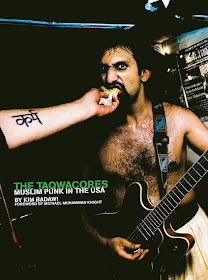 This is the first iteration of The Kominas tour poster. Which do you prefer? (Forgetting the fact that the second is the 'correct' version. Whichever you choose, you must admit that The Kominas really have the image thing going on.
This is the first iteration of The Kominas tour poster. Which do you prefer? (Forgetting the fact that the second is the 'correct' version. Whichever you choose, you must admit that The Kominas really have the image thing going on. And the kufiya thing going on. (This photo is from their Facebook page.)
And the kufiya thing going on. (This photo is from their Facebook page.)
Other Kominas and taqwacore-related items that I've come across of late (mostly, in fact, courtesy of The Kominas).
##A video of highlights of the 2007 Taqwatour, with The Kominas, Al-Thawra, Omar Waqar, Vote Hizballah, and The Secret Trial Five.
@@A report from The Guardian on a new book (The Taqwacores: Muslim Punk in the USA) featuring photographer Kim Badawi's images of Islamic punk bands, from 2005-07.
 %% The Kominas have recorded a new track, "Blackout Beach," which was featured in a new play, "Water Board: A Play About Torture," which is being performed today at the YMCA Theater, Cambridge, MA. (Please read about it--I can hardly stomach it myself.) You can hear the song on The Kominas myspace page--or if you're a "fan," on Facebook.
%% The Kominas have recorded a new track, "Blackout Beach," which was featured in a new play, "Water Board: A Play About Torture," which is being performed today at the YMCA Theater, Cambridge, MA. (Please read about it--I can hardly stomach it myself.) You can hear the song on The Kominas myspace page--or if you're a "fan," on Facebook.^^A long trailer for the film, Taqwacore: The Birth of Punk Islam.
&& Watch The Kominas practice. With trumpet. They keep putting out these clips, so stay tuned.
I just got hold of John Lennon's The Lost Home Tapes 1965-1969. It's cool that we can have access to The Kominas home tapes almost instantaneously. Not that The Kominas are The Beatles, but Shahjehan Khan does bear a resemblance to John Lennon.
^^Nice interview with The Kominas. The word means "scum" in Urdu. They explain their humor. And their politics. "Shariah Law in the USA." Taqwa: Terrorists Are Quite Well Adjusted.
Again, be sure to go see The Kominas if they are playing anywhere near you. Hopefully their next tour will swing by NW Ark.








